- Home
- Gregory Maguire
Egg & Spoon Page 2
Egg & Spoon Read online
Page 2
There’d been few people to reply. Some wives, several farmworkers, toddlers and teenage boys, old men and older women. Alexei, on one of the departing carts, had not waved farewell to Elena and Luka. He’d stared at the sky with his chin up to keep anything from showing.
Dr. Peter Petrovich Penkin saw humans now. He insisted that he wasn’t qualified, but the remaining villagers of Miersk had no other doctor to trust, and Peter Petrovich was a kind man and a good one. Yes, a good man, despite his breath, which smelled as if he had inhaled all the animal and human germs he had ever met, and kept samples in the twin cabinets of his lungs.
The horse doctor was just leaving Elena’s hut. He shook his cane at her. “Where have you been, with your mother so poorly?”
“I was looking for the last of the hens,” replied the girl, “though I think the foxes got there first.”
“The only onions left on my shelf are running to jelly. So I declare this Onion Liberation Day. I made a broth, but broth is not enough. On onion broth, your mother will not improve.” The doctor spoke with impatience, as if he had a dozen more appointments. “She is failing to thrive, Elena. Show me what you found.”
The girl brought out the handful of acorns. The doctor shook his head. “Split the meat from the shells and boil them soft. You can add them to the onion broth. It’s better than nothing. Unless it poisons her. Remember, I’m a horse doctor, not a chef.”
“She’s better, isn’t she?” But Elena sounded dubious.
“She’s too weak to do anything but pray, so she is praying for a better harvest this year than last. Are you sure all the chickens have been eaten? Maybe they were just hiding.”
“The last one was the black hen, and I’m afraid she’s been carried off, too. Or run away. Doctor, what are we to do?”
He purred a finger against his lips. “Hmmm. It’s too soon for cuckoo’s eggs. I’m told that nothing has wintered over in the kitchen gardens of the big house. Miersk is barren. The soil is bankrupt. So sip away: it’s Onion Liberation Day.”
“We have nothing to pay you with.” Elena fixed her gaze on the track that passed as a road. She couldn’t look directly at him. In this she took after Alexei.
“No one in Miersk has a kopek to spare,” said the doctor. “Once the serfs got their freedom, we earned the freedom to starve. Listen, my little chickadee: If your mother gets well enough to plant a squash seed, and if she waters it with her tears so it becomes a great golden turban, and then if she’s strong enough to pick it and to bake it for me … well, then, I’ll come and eat squash pie. That’s a reward worth waiting for. Now: How about you, you fretful child? Are you eating enough?”
Elena didn’t answer him. What answer was there?
The doctor observed, “Luka isn’t much of a scavenger, is he.”
Defending her brother, she muttered, “The world around Miersk is scavenged out.”
The doctor licked his forefinger and stuck it out in the wind, to judge the direction of the cold. “May he go a bit farther abroad to find better pickings.”
And that was the doctor’s curse, though Elena didn’t see it as such.
So the doctor pulled his tattered coat around him and left. He took with him his small climate of diseased breath. Elena could hear him puffing it out with each step. He was a big man, but like everyone else, he was thinning. While liberating his onions in their direction.
Maybe the doctor’s presence had made Mama anxious. A doctor inside the izba usually means something is wrong. Mama turned her head on the pillow at the sound of Elena’s footstep.
“Luka?”
Mama always asked for him first: he was her firstborn. And a boy. Elena knew that was not Luka’s fault, just his luck. “Luka is checking his traps.”
“And Alexei?”
Elena drew a breath. Alexei had been borrowed by the báryn. He wouldn’t come back until the báryn’s family returned to the district. Mama knew this. But just now Mama wasn’t remembering. A sign of steeper decline?
Elena tried faking the truth. How easily lying comes to this one. Watch how she does it. “Alexei is busy with Grandmother Onna.” Grandmother Onna was a childless old spinster, granny to no one and thus everyone. She lived in a room attached to the village shop, which did her no good now that the shelves were all empty. She was simple and she minded young children during the day, not for money but because they made her happy and kept her from throwing herself absentmindedly into the well.
Elena’s mother should recall that Alexei wasn’t with Grandmother Onna. But the lie worked, it calmed her mother, which both relieved and worried the girl.
“Where is Elena?” said Mama.
Now Elena smiled. This was a familiar game, not lying but make-believe. “Elena has gone to Moscow,” she told her mother. “The Tsar invited her to a ball.”
“Ah, how will she know the way? She’d better bring my magic doll for advice.”
“Elena will dance all night and eat everything in sight —” But here Elena stopped; talking about distant food was cruel when there was none to be eaten nearby.
“Ah. I hope she doesn’t come home too grand for us,” said Mama. Her eyes closed. “Elena?” she whispered. “If I die, will you children take care of one another?”
“You won’t die, Mama.”
“Promise me.”
Elena sat still. She thought, My promises aren’t worth a swear word scratched on birch bark.
Finally she thought of something peaceable to say — “Would you like me to bring you your doll, Mama? Mamenka?”— because recently when Mama was half asleep, she would hold the doll and it seemed to soothe her.
As Elena waited, a roll of thunder cleared its throat. Thunder is a summer sound, usually. It’s all wrong for midwinter. Still, lightning was cooking in those clouds. Mama, startled from her thoughts, cried out, “Luka.”
Elena slammed out the door. She was running to find her brother, this is true. But she was also running from the fact that, in a crisis, her mother called for her oldest child, for her first son. Luka, almost always for Luka. Rarely for Alexei. Never for Elena.
Perhaps I make her sound petulant. The girl was aggrieved, she was running. A coward, or a sensitive urchin? Draw your own conclusions. I’m just telling you what happened, not what it means. Perhaps it means nothing.
Look again, before things go wrong.
Ha. As if they’re all that right to start out with.
What do we have so far?
Here’s a girl running through this place. What kind of a place is it? An old-fashioned one. Some distance away in custom and in geography, too. Examine it as you would a stage set when the curtains open. The larches near the village well, the tumbledown farm buildings empty of livestock, the stubbly fields and the pale ravaged pastures and the woods all around.
The world had gone upside down. Midwinter, and the snow already melting off, draining away. Elena didn’t even need her mittens. And above the ridge of hills, beyond the known neighborhood, cloud armies bumbled and massed.
She hurtled along the track to find her big brother. Mama demanded it. Elena could resent Luka and rely on him at the same time. With Papa dead and Alexei in Moscow, Luka was her touchstone. As for this unpeopling village, its alleys and stricken yards — it was like running through a bad dream.
Then, past these trees and those, she saw her brother. His sack was tied at his belt, slapping too freely. Little or no weight in it. No food. No supper. “Luka,” she called.
He looked beaten, but he straightened at her voice. A show of strength, anyway. “Have you checked for eggs?”
She didn’t want to admit that the last black hen was missing, presumed dead. A raw chicken dinner for some lucky fox. So she replied, “The doctor came. He thinks Mama is not getting better yet.”
Luka sneered. “He couldn’t diagnose a wart on a warthog. He’s a big fake.” But he stopped as he and his sister became aware of another sound, unearthly but of the earth: at ground level. The
y shouldn’t have paused —
But children have a hard time imagining dangers they’ve never met before. They turned, with that curiosity to know. An instinct that betrays children and their elders every day of the universe’s long life. Lot’s salty wife on her road, Pandora’s itchy imagination.
Upon them, around them, a drumming of horseshoes on frozen ground. Seven, eight, ten angry mares, cropped to the task by their riders. One of the horses reared and whinnied, a rumbustious hnbree-eee-eee. Elena thought she and Luka would be stamped off balance and trampled to death.
“Whoever they are, they won’t get my catch,” muttered Luka. “I won’t let them.” He stood his ground.
The commander of this sortie took off his cap. “Another gosling to join the few we found in the fields,” he said, not to the children but to his men. Then, to Luka: “Lad, is your father out with the other village men who were felling dead trees for firewood? And if not, where will we find him?”
Luka replied, “You will find my father in his unmarked grave. If you can.”
“Your brother, your uncle, your grandfather, then?”
“I am my family’s man.”
The commander paused, and might have passed on. But an underling said, “Sir, shall we leave him be? He’s just a boy….”
At this, the commander flinched. No enlisted man criticizes a superior officer. “We were told to bring fifteen men from each estate, and we have fourteen,” declared the commander. “Take him.”
From the chapel of Saint Veronika across the way, two women came running. Their scolding roused the doctor in his study. Peter Petrovich Penkin saw disaster through his window. He roared from his doorway, “You can’t — he’s a child.” The flopping pocket of his big coat caught on his door latch. He worked to free it. “I’ll come in his stead.” His voice confident and false.
“You’re too ancient to be useful,” said the commander.
“I’m a doctor; doctors are always useful. Take me. Besides, that boy has infections that will bring down a battalion.” Lies, lies, kindly but useless. The doctor shook his cane in the air, ripped his pocket stitches, and almost fell off his doorstep onto his face.
“We take fifteen men from this village,” shouted the commander. “That’s our charge, and I require it. Company, onward.”
The women began to understand that their men were being impressed into service. They shrieked to raise their sisters. They rushed at the horses to scare them away. In the flurry of their whipping skirts and aprons, Elena couldn’t quite see what happened. Luka’s feet were lifting off the ground. He was being slung like a saddlebag on the back of a horse, behind a horseman with a pistol in his hand.
The rider aimed it at the doctor, and then turned to menace the emboldened women, who fell back.
From the porch of the shop tumbled Grandmother Onna, wobbling under the weight of a rifle. She raised it to her face. “My aim is unsteady and I don’t intend to kill anyone, but I might,” she cried. “Let the boy go.”
“Grandmother Onna is loose,” announced the doctor. The ruse of nonsense. “Usually we tie her to the chair for her own safety. Don’t mind her, she left her mind along with her youth in the back alleys of Novgorod. Onna, give me that thing, no one is after your virtue anymore.” He swiveled her way.
The frisky horses shied and were cropped with hard thunks. The commander said, “Put down that rifle or I’ll arrest you.”
The doctor’s bad leg slowed his approach. Elena was nearer the mad old pepperpot. Without thinking, she grabbed Grandmother Onna’s gun out of her hands. A shot cracked out, more whip-snap than musical zing. Elena didn’t think it was from the old woman’s rifle, but she tossed the weapon in the well just in case.
The gunshot was the commander’s, firing into the air to frighten everyone.
The horses capered and nickered. The only human sound was Grandmother Onna grumping. “That was my best husband. Now he’s drowned. You little stinker.” Her other remarks were lost in the pummel of horse hooves as the company wheeled about.
Before he disappeared, Luka managed to wrench his sack off his belt and toss it on the ground. After the party of ambush cantered away, Elena snatched it up. Inside she found the carcass of a baby hare. One of the horses must have stamped on it, for the creature now was a handful of bloody guts, fur, fractured bones.
That evening Elena scraped two mouthfuls of meat from the remains. She added the stewed acorns and scrappy flesh to the onion broth, and fed a cup to Mama. She couldn’t bring herself to taste even a sip of it. She was a child of stone that night.
Now: Remember the curse? The doctor’s wish for Luka to go farther abroad to find food? Farther he was going, farther every moment, abducted, on the back of a horse. What good might come of it, if any, we shall see.
There was a blessing, though, of sorts. By sundown Mama was too lost in fever to be able to count the people in the room. She didn’t take in anything: that Alexei was gone away into domestic service, that the soup was horrid, that Luka was missing, too. Elena sat at her bedside holding the matryoshka baby.
I always think a weeping child makes a sweet picture, don’t you? I see this in a dim, crepuscular light, a little greenish. A fiddle playing a long note, heavy on the vibrato, would punch the effect up a little. But I have no idea if anyone in Miersk can play so much as a squeezebox. You’ll have to add the melody yourself.
The good doctor came by just before dawn to look in on Elena’s mother. “I couldn’t sleep, so why should you?” he demanded of Elena. He brought some tinder and banked up the fire, and he clucked over Mama and rubbed her hands to warm them. That was the only medicine he had to offer today.
Natasha Rudina didn’t stir under his attentions. He stood back. “So have you made a decision, then?” he said to Elena’s mother. “Come now. You have to want to live your life.”
He nodded Elena out of the house to confer. They stepped off the threshold and began to stroll, keeping their voices low. The world was darkness, inside Elena and out.
“How is she taking the abduction of her luckless boychik?” asked the doctor.
“I haven’t told her about it.”
The doctor glanced at her. “And she hasn’t asked? Child, you shouldn’t carry all this on your own shoulders.”
“Who is going to help? Who is left to ask? Saint Nicholas? Saint Nobody.”
“Don’t be withering. Grandmother Onna might pitch in, and it might do her some good, too. I’ll ask her.”
“I heard more carts going by last evening. What’s left of the Rudetsky household was clustered around the shafts of their wagon, pulling it themselves.”
“So the wives of the conscripted men are leaving to harbor with relatives elsewhere. Can you blame them? First their daughters taken, now their husbands.”
“Are you going, too?” The girl’s voice was cold.
“And leave you all alone with a bed-bound mother? What kind of doctor would I be if I abandoned those who need me most?”
You’re not much of a doctor to begin with, thought Elena, but she kept that to herself. “Why did that commander scoop up Luka and our other men, too?”
The doctor held up his hands, palms out, as if he were on trial. “Who can say? There isn’t any military need. No Crimea in the offing. I’d have heard. A doctor can make out quite well during a war. I’d have sent back rations from the front, anyway.”
“What are we going to do? Such a bad harvest last summer and too little snow now to irrigate the fields come spring …”
“The world is protesting. It feels like a summer cloudburst coming, yet the hymns of the high holidays still ring in our ears. Can the calendar turn inside out? Can a year run backward?” But the doctor could never stay down-spirited for long. “We could break into the báryn’s big empty dacha and chip the plaster angels off the ceiling. Roast putti du jour.”
“Is starvation making you mad?”
“We are together,” said Peter Petrovich. “When we have
nothing left, we’ll divide it in half and each take a portion. We’ll fill the samovar with tea brewed from our salt tears. Grief is hard to swallow; you have to take it slowly. I declare this One Sip at a Time Day.”
“That’s not enough.” They had reached the place in the path where the old combine had broken down, never to stir again, and was rusting into eternity. “You should go to the Tsar and find out why he has stolen Luka and the others.” She spoke as she thought Luka might, with nerve. “Maybe the Tsar plans to send them to war against some country that had a better harvest last year.”
“With my bad leg, I’d be dead of exhaustion before I reached the first crossroads. And anyhow, which way should I turn? Who knows the way to the door of the Tsar? Ambition without direction is like milk without a cup.” He shrugged. “But if I got there, I would bring him a flask of our tea of salt tears and say, ‘Try a sip, dear Tsar: it is One Sip at a Time Day.’” He laughed at his own conceit, laughed until salt tears came out of his eyes.
He almost didn’t hear Elena say, “Then I’ll have to go see the Tsar myself.” But little by little, he stopped laughing.
“Very well. And for directions, you will ask whom? The spirit of your dead father, maybe? Don’t look at me like that, child. I’m trying to make a point —”
Though a tender nonsense of the doctor’s, and meant without malice, this hit like a slap. “I’ll ask Baba Yaga, the old witch of the woods, if I have to,” she cried. “Don’t think I won’t.”
Chastened, he pawed the air toward her with one hand, and she reached out and found his hand in the dark. They walked in silence for a few moments. “I hope you don’t leave,” said the doctor.

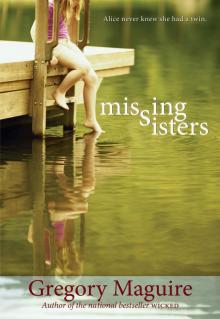 Missing Sisters
Missing Sisters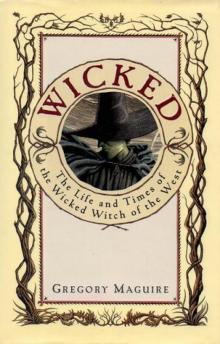 Wicked: The Life and Times of the Wicked Witch of the West
Wicked: The Life and Times of the Wicked Witch of the West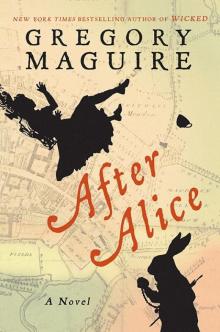 After Alice
After Alice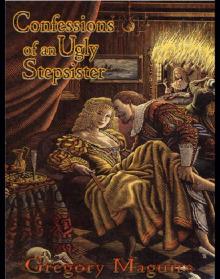 Confessions of an Ugly Stepsister
Confessions of an Ugly Stepsister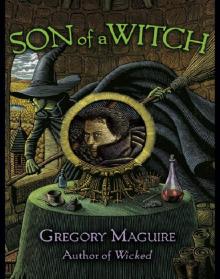 Son of a Witch
Son of a Witch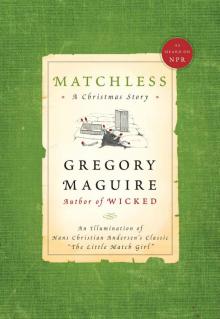 Matchless
Matchless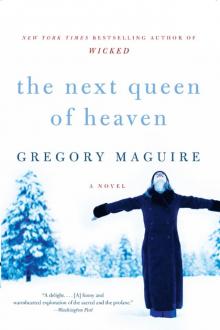 The Next Queen of Heaven
The Next Queen of Heaven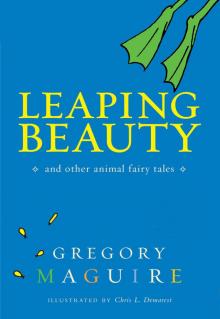 Leaping Beauty: And Other Animal Fairy Tales
Leaping Beauty: And Other Animal Fairy Tales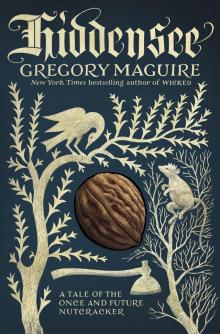 Hiddensee: A Tale of the Once and Future Nutcracker
Hiddensee: A Tale of the Once and Future Nutcracker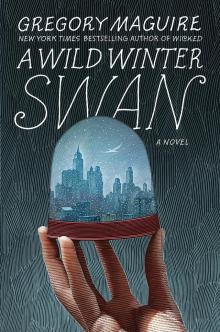 A Wild Winter Swan
A Wild Winter Swan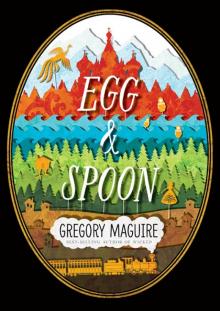 Egg & Spoon
Egg & Spoon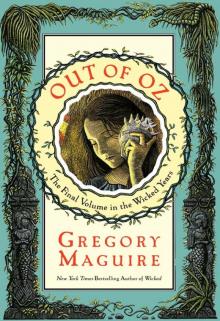 Out of Oz
Out of Oz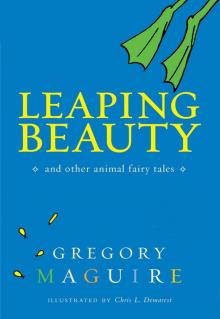 Leaping Beauty
Leaping Beauty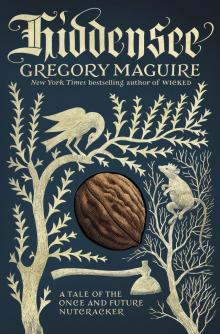 Hiddensee
Hiddensee The Wicked Years Complete Collection
The Wicked Years Complete Collection The Next Queen of Heaven: A Novel
The Next Queen of Heaven: A Novel